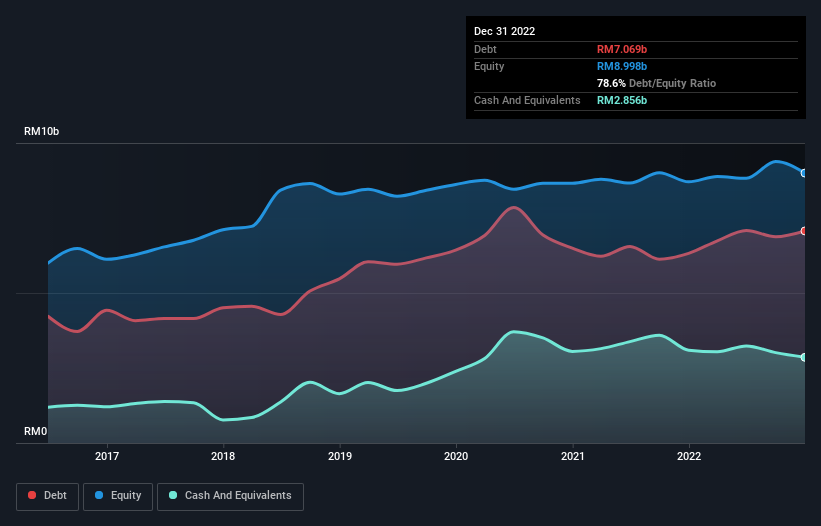Some say volatility, rather than debt, is the best way to think about risk as an investor, but Warren Buffett famously said that 'Volatility is far from synonymous with risk.' It's only natural to consider a company's balance sheet when you examine how risky it is, since debt is often involved when a business collapses. Importantly, Hap Seng Consolidated Berhad (KLSE:HAPSENG) does carry debt. But should shareholders be worried about its use of debt?
Why Does Debt Bring Risk?
Debt is a tool to help businesses grow, but if a business is incapable of paying off its lenders, then it exists at their mercy. In the worst case scenario, a company can go bankrupt if it cannot pay its creditors. However, a more common (but still painful) scenario is that it has to raise new equity capital at a low price, thus permanently diluting shareholders. Of course, plenty of companies use debt to fund growth, without any negative consequences. When we think about a company's use of debt, we first look at cash and debt together.
Check out our latest analysis for Hap Seng Consolidated Berhad
How Much Debt Does Hap Seng Consolidated Berhad Carry?
As you can see below, at the end of December 2022, Hap Seng Consolidated Berhad had RM7.07b of debt, up from RM6.32b a year ago. Click the image for more detail. However, it also had RM2.86b in cash, and so its net debt is RM4.21b.

A Look At Hap Seng Consolidated Berhad's Liabilities
The latest balance sheet data shows that Hap Seng Consolidated Berhad had liabilities of RM4.26b due within a year, and liabilities of RM5.40b falling due after that. Offsetting this, it had RM2.86b in cash and RM1.86b in receivables that were due within 12 months. So it has liabilities totalling RM4.94b more than its cash and near-term receivables, combined.
This deficit isn't so bad because Hap Seng Consolidated Berhad is worth RM12.6b, and thus could probably raise enough capital to shore up its balance sheet, if the need arose. However, it is still worthwhile taking a close look at its ability to pay off debt.
We use two main ratios to inform us about debt levels relative to earnings. The first is net debt divided by earnings before interest, tax, depreciation, and amortization (EBITDA), while the second is how many times its earnings before interest and tax (EBIT) covers its interest expense (or its interest cover, for short). Thus we consider debt relative to earnings both with and without depreciation and amortization expenses.
Hap Seng Consolidated Berhad has a debt to EBITDA ratio of 3.4 and its EBIT covered its interest expense 6.7 times. This suggests that while the debt levels are significant, we'd stop short of calling them problematic. Importantly, Hap Seng Consolidated Berhad's EBIT fell a jaw-dropping 34% in the last twelve months. If that decline continues then paying off debt will be harder than selling foie gras at a vegan convention. There's no doubt that we learn most about debt from the balance sheet. But you can't view debt in total isolation; since Hap Seng Consolidated Berhad will need earnings to service that debt. So if you're keen to discover more about its earnings, it might be worth checking out this graph of its long term earnings trend.
Finally, while the tax-man may adore accounting profits, lenders only accept cold hard cash. So we always check how much of that EBIT is translated into free cash flow. In the last three years, Hap Seng Consolidated Berhad's free cash flow amounted to 46% of its EBIT, less than we'd expect. That's not great, when it comes to paying down debt.
Our View
Mulling over Hap Seng Consolidated Berhad's attempt at (not) growing its EBIT, we're certainly not enthusiastic. But at least it's pretty decent at covering its interest expense with its EBIT; that's encouraging. Once we consider all the factors above, together, it seems to us that Hap Seng Consolidated Berhad's debt is making it a bit risky. That's not necessarily a bad thing, but we'd generally feel more comfortable with less leverage. The balance sheet is clearly the area to focus on when you are analysing debt. However, not all investment risk resides within the balance sheet - far from it. For instance, we've identified 4 warning signs for Hap Seng Consolidated Berhad (2 are potentially serious) you should be aware of.
If, after all that, you're more interested in a fast growing company with a rock-solid balance sheet, then check out our list of net cash growth stocks without delay.
Valuation is complex, but we're here to simplify it.
Discover if Hap Seng Consolidated Berhad might be undervalued or overvalued with our detailed analysis, featuring fair value estimates, potential risks, dividends, insider trades, and its financial condition.
Access Free AnalysisHave feedback on this article? Concerned about the content? Get in touch with us directly. Alternatively, email editorial-team (at) simplywallst.com.
This article by Simply Wall St is general in nature. We provide commentary based on historical data and analyst forecasts only using an unbiased methodology and our articles are not intended to be financial advice. It does not constitute a recommendation to buy or sell any stock, and does not take account of your objectives, or your financial situation. We aim to bring you long-term focused analysis driven by fundamental data. Note that our analysis may not factor in the latest price-sensitive company announcements or qualitative material. Simply Wall St has no position in any stocks mentioned.
About KLSE:HAPSENG
Hap Seng Consolidated Berhad
An investment holding company, engages in the plantation, property investment and development, credit financing, automotive, trading, and building materials businesses in Malaysia and internationally.
Excellent balance sheet with proven track record.
Similar Companies
Market Insights
Community Narratives



